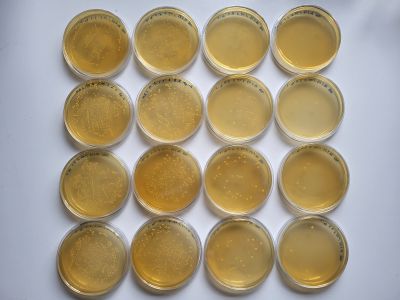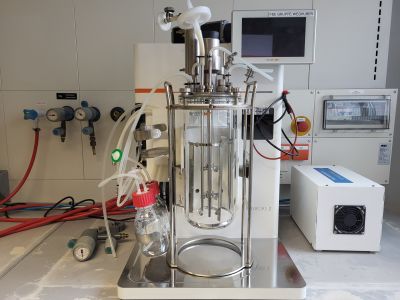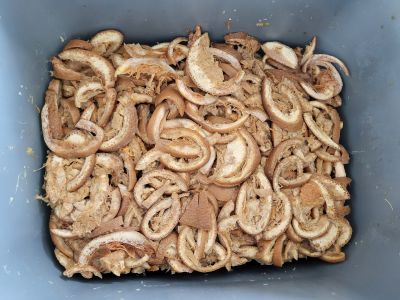FERMENTATION AND MICROENCAPSULATION OF FEED ADDITIVES
Improving bio-efficacy of phytochemicals for animal health

Bacterial colonies on agar plates
Picture: Alice König

Bioreactor
Picture: Alice König

Fermented citrus peel
Picture: Alice König
Animal health plays an essential role in the production of high-quality meat, dairy products and eggs. However, young animals in particular are very susceptible to infections and diseases. Several plant-derived substances (termed “bioactive compounds” or “phytochemicals”) can support intestinal health, growth performance and resilience against disease in farm animals and are used as feed additives.
Many plants store their active chemicals in the form of inactive glycosides, where sugar molecules are bound to the functional groups (the chemically active parts) of the bioactive molecules. The plant removes these sugars and thus activates the chemicals when they are needed with the plant’s own enzymes. When bioactive compounds are extracted from plants, it is largely the inactive glycosylated form that is obtained.
To exert any biological effect in the animal, the bioactive ingredients added to feed must pass an animal’s intestinal barrier and be available at the site of action. However, glycosylation of phytochemicals often limits their intestinal absorption, thereby excluding health-promoting effects. Since the plant enzymes needed to hydrolyse the sugars are not present in the animal gut, other methods must be used to remove the sugars from the glycosylated, inactive form of the plant compound and improve its absorption in the gut.
This project aims to establish a method for releasing of bioactive plant substances in glycosidic linkages by means of microbiological cleavage in order to increase their bioavailability and biological effectivity. Selected plant extracts will be analytically characterized and fermented in order to remove the sugar compounds. First, small-scale fermentation experiments will be performed to determine optimal parameters. Once appropriate bacterial strains as well as the right parameters have been identified, the selected raw material can be fermented in a small bioreactor. In addition, the efficacy of fermented and/or microencapsulated substances will be investigated in suitable in-vitro and in-vivo models. During microencapsulation substances are embedded in matrix to form small capsules. Temperature, acidic environment or enzymes can then trigger the release of the bioactive component in the gastrointestinal tract. The focus is on gaining knowledge about the feasibility and efficiency of fermentation and microencapsulation to increase biological activity of plant-based feed additives.
Lead Researcher:

FH-Prof. Priv.-Doz. Dr. Julian Weghuber
FFoQSI Area Leader GREEN
Head of Department
Food Technology and Nutrition, University of Applied Sciences Upper Austria
julian.weghuber@fh-wels.at
+43 5 0804 44403
www.fh-ooe.at

